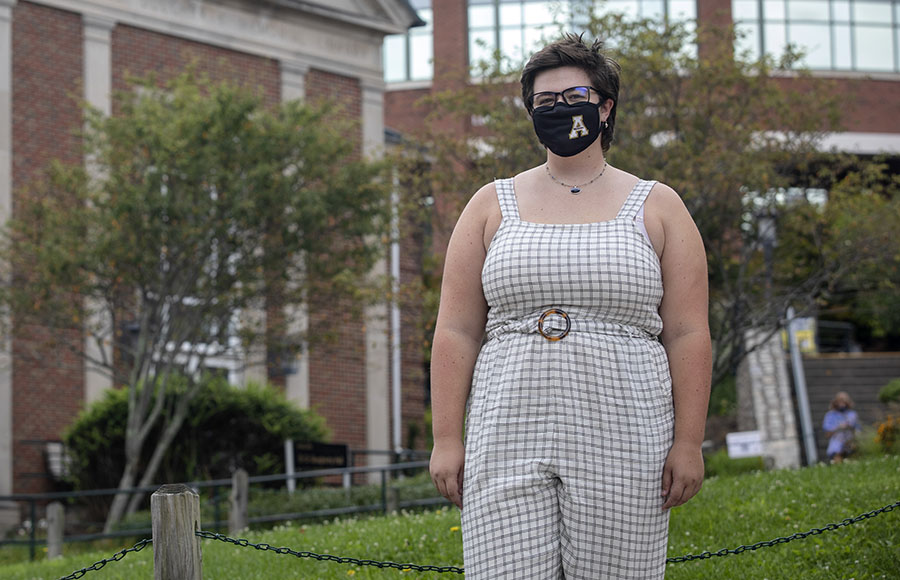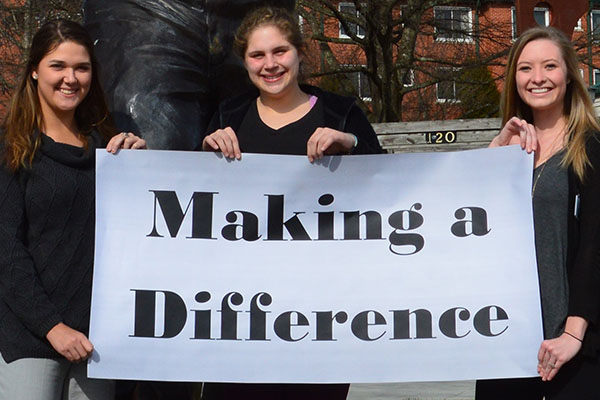BOONE, N.C. — Senior public health major Caroline Pruitt works to spread the good news about wellness and how fellow students can take better care of themselves.
She is one of 34 wellness peer educators within Appalachian State University’s Department of Wellness and Prevention Services (WPS) in the Division of Student Affairs. They offer informational presentations to fellow students about topics such as mental health and nutrition.
Academic success and the eight factors of wellness go hand in hand, said Pruitt, who is from Raleigh.
“If you’re not eating well or getting enough sleep, you’re certainly not performing at your best,” she said.
Pruitt said some college campuses have a culture of competition around who can take care of their bodies in the worst way, such as through lack of sleep and consumption of energy drinks or caffeine. “Wellness works in a way to deconstruct that culture and open up spaces for people to be honest about how they are really feeling,” she said.
Pruitt encourages her classmates to build into their daily lives more positive talk about staying healthy. “Incorporating wellness into something people can talk about in a positive way — ‘I did self-care today; I danced for 10 minutes and feel so much better’ — is a way that can help you focus on your class work,” she said.
She offers these suggestions for how students can support their wellness, especially during the uncertainties of COVID-19:
- Talk to your professors if you’re having trouble in your classes.
- Explore campus resources such as Wellness and Prevention Services, University Writing Center, Student Learning Center and Off-campus Student Services.
- Cultivate interests outside of academics, such as small hobbies.
- Get up and move.
“Focus on things that make you feel good. A lot of times, wellness really can be that simple,” she added.
For Pruitt, wellness activities might be trying a new recipe with her roommate, dancing to a song or FaceTiming with a friend for 10 minutes, and/or exploring new pastimes — this semester she has taken up roller skating and cross-stitching as ways to stay grounded.
“I had anxiety when school started back up because it was an uncertain situation. I also had to remember that it’s OK to talk to my friends about it. Remember, your friends are your support network and care about you, and that it’s important to not go through those things alone,” she said.
Why Pruitt chose Appalachian
Pruitt said she chose Appalachian because she was looking for a school that was inclusive of LGBT students and academically challenging, yet also focused on developing the whole person through cocurricular activities and a sense of community.
“That was super appealing to me — it’s just an amazing environment,” Pruitt said about App State. From professors to staff, she said she has found “they’re invested in me as a person and what I want to do beyond App.”
Pruitt said she decided to major in public health because of the field’s varied career options and focus on social justice and equity.
She is graduating with honors in the Department of Health and Exercise Science, which houses the public health program. The research for her honors thesis, chaired by Dr. Adam Hege, focuses on the health of college students identifying as LGBT+. She also is interning with WPS this fall.
Pruitt plans to graduate in December and begin her career working with a local public health department before attending graduate school to study social epidemiology.
What do you think?
Share your feedback on this story.
About Student Affairs at App State
Student Affairs at App State supports student success and well-being by fostering a culture of care, inclusion and engagement. Its mission is to develop lifelong learners and dynamic leaders through meaningful experiences that challenge and support students. Grounded in a commitment to care, engage and transform, Student Affairs creates a student-centered environment that encourages resilience, leadership, service and global learning. Student Affairs encompasses the following units: Campus Activities, Case Management, the Child Development Center, Community-Engaged Leadership, Counseling and Psychological Services, Office of the Dean of Students, New Mountaineer and Family Engagement, Off-Campus Student Services, Plemmons Student Union, Student Conduct, M.S. Shook Student Health Service, Student Legal Services, Student Veteran Services, University Recreation, and Wellness and Prevention Services. Learn more at https://studentaffairs.appstate.edu.
About the Beaver College of Health Sciences
Appalachian State University’s Beaver College of Health Sciences (BCHS), opened in 2010, is transforming the health and quality of life for the communities it serves through interprofessional collaboration and innovation in teaching, scholarship, service and clinical outreach. The college enrolls more than 3,600 students and offers 10 undergraduate degree programs, nine graduate degree programs and four certificates across seven departments: Kinesiology, Nursing, Nutrition and Health Care Management, Public Health, Recreation Management and Physical Education, Rehabilitation Sciences, and Social Work. The college’s academic programs are located in the Holmes Convocation Center on App State’s main campus and the Levine Hall of Health Sciences, a state-of-the-art, 203,000-square-foot facility that is the cornerstone of Boone’s Wellness District. In addition, the college supports the Appalachian Institute for Health and Wellness and has collaborative partnerships with the Wake Forest University School of Medicine’s Physician Assistant Program, UNC Health Appalachian and numerous other health agencies. Learn more at https://healthsciences.appstate.edu.
About Appalachian State University
As a premier public institution, Appalachian State University prepares students to lead purposeful lives. App State is one of 17 campuses in the University of North Carolina System, with a national reputation for innovative teaching and opening access to a high-quality, cost-effective education. The university enrolls more than 21,000 students, has a low student-to-faculty ratio and offers more than 150 undergraduate and 80 graduate majors at its Boone and Hickory campuses and through App State Online. Learn more at https://www.appstate.edu.





![How NCInnovation Is Rethinking Economic Development in North Carolina [faculty featured]](/_images/_posts/2026/02/rethinking-economic-development-600x400.jpg)







